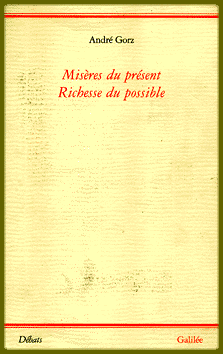Universal Income
In its purest form, universal income defines a right to an unconditional, self-supporting allowance for every citizen since birth to death. The concept originated in human sciences (sociology, economics, politics) where it can also be referred to as citizens income, basic income or guaranteed annual income.
When the need for an alternative social contract is being felt, universal income escapes from its academic confines and comes to the rescue. In a context of wild liberalism, disintegration of social cohesion, unstable markets and globalized poverty, it appears that universal income is once more gaining momentum.
The debate on universal income is particularly vivid in France, where for the first time the unemployed has manifested itself as a political force. Also, more and more books that deal with global economy cannot avoid the subject and address its pertinence or feasibility. One of those publications is "Misères du Présent, Richesses du Possible" by André Gorz, which is also an outstanding reading by any other mean. What follows is a summary of Gorz's vision on universal income as exposed in pages 134-152.
Welfare
If welfare systems differ radically from one country to another, they mostly share an absurdly cumbersome legislation. Universal income is not an amendment of the welfare system. It suppresses it instead, albeit incidentally. Universal income is primarily a device for a new society where employment stops being the key to citizenship, and where economical profits translate into free time.
Gorz promotes the idea that every man should be free to engage in one or more activities of which none must necessarily be lucrative. Men realise themselves in life, not in work. At least not in its institutional instance. Work is not something we have or haven't, it's what we do.
In order to be effective, universal income must comply to the following principles:
a) the allowance must be self-supporting.
If the allowance isn't sufficient for subsistence, an opposite result is achieved, as "workfare" experiences have shown quite clearly. The unemployed remains in need of a job, and accepts conditions he wouldn't have otherwise. The employer benefits from a cheap workforce whose income is complemented by the state. The result is a subsidized, second rate employment market with low wages and qualified people occupying positions that don't require them.
b) the allowance must be unconditional.
Requiring a counterpart for the allowance, like voluntary work, corrupts the very basic essence of activities that are accomplished for their own sake. Universal income is a generative policy (Anthony Giddens): it generates conditions in which people readily assume higher responsibilities for their own lives. In this sense, it encourages activity without requiring it to be profitable. Activities like art, community work, mutual aid or assistance can only flourish if they are initiated by the recognition of their value as such, and not by being the compulsory counterpart to a basic income.
Budget
Currently, not a single state can afford to finance a universal income scheme. But the truth is that government can no longer finance more straightforward public interest programs neither. Income taxes are consistently lowered from fear to chase capital away. Corporations invoke the "cost of investment" argument to further rationalize treatments of favor. But this argument is fallacious, because production is cheaper than ever. Production isn't driven by labor anymore, but by knowledge. Increasing benefits are made with a decreasing workforce. But if society stops requiring from everyone to produce, why should it penalize those who effectively don't or can't?
In a hi-tech world, the integrated system of man-machine-organization is the basic production unit. Its performance is linked to the capacity of individuals to organize themselves so as to maximize the transmission of knowledge. The company's turnover is an image of that effort. More globally, wealth is produced by people living, working and learning together, and therefore it is a collective belonging (René Passet). A universal income scheme restores within the logic of wealth distribution this choice of ours to live in and as a society.
© Daniel Szmulewicz, 1996 - 2011


